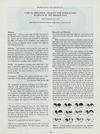
People with Down syndrome have a higher risk of skin disorders and need better screening and treatment.
 25 citations,
January 2015 in “Advances in Psychosomatic Medicine”
25 citations,
January 2015 in “Advances in Psychosomatic Medicine” Many skin patients also have mental health issues, and doctors should treat both together.
 25 citations,
November 2022 in “British journal of dermatology/British journal of dermatology, Supplement”
25 citations,
November 2022 in “British journal of dermatology/British journal of dermatology, Supplement” Baricitinib for severe alopecia areata is generally safe, with common side effects like infections and acne, and low rates of serious complications.
 January 2024 in “Acta Facultatis Medicae Naissensis”
January 2024 in “Acta Facultatis Medicae Naissensis” Cosmeceuticals are important for managing skin issues during the COVID-19 pandemic.
 2 citations,
June 2023 in “Skin Research and Technology”
2 citations,
June 2023 in “Skin Research and Technology” Yellow dots and short vellus hairs are the most common signs of Alopecia Areata (AA), and trichoscopy can help diagnose AA and track treatment progress.
November 2022 in “Frontiers in Medicine” PRP shows promise for treating mild alopecia areata but needs more research for cicatricial alopecias.
 January 2025 in “Clinical Cosmetic and Investigational Dermatology”
January 2025 in “Clinical Cosmetic and Investigational Dermatology” Clascoterone cream effectively reduces acne severity and is safe for patients 12 and older.
1 citations,
December 2023 in “Life” PRP helps skin heal, possibly through special cells called telocytes.
May 2024 in “Journal of Fungi” Tinea capitis in adults, especially postmenopausal Black women, needs prompt treatment with oral antifungals to avoid scarring.
132 citations,
November 1998 in “Journal of the American Academy of Dermatology” Topical sensitizers have mixed success in treating alopecia areata.
 April 2024 in “Frontiers in microbiology”
April 2024 in “Frontiers in microbiology” Certain gut bacteria may increase or decrease the risk of male pattern baldness.
2 citations,
March 2019 in “PubMed” Fusidic acid successfully treated a rare scalp infection with hair regrowth and no recurrence after 6 months.
 1 citations,
June 2022 in “PubMed”
1 citations,
June 2022 in “PubMed” Alopecia causes hair loss and should be treated early, especially scarring types where hair cannot regrow.
 48 citations,
November 2017 in “Journal of the American Academy of Dermatology”
48 citations,
November 2017 in “Journal of the American Academy of Dermatology” Tofacitinib 2% ointment helped hair regrow in 3 out of 10 patients with alopecia areata, but caused side effects like scalp irritation and raised cholesterol in some.
 May 2015 in “Journal of The American Academy of Dermatology”
May 2015 in “Journal of The American Academy of Dermatology” Both treatments help with hair regrowth in alopecia areata, but azathioprine has milder side effects than betamethasone.
 80 citations,
September 1984 in “Journal of The American Academy of Dermatology”
80 citations,
September 1984 in “Journal of The American Academy of Dermatology” 5% minoxidil helps hair regrowth in androgenic alopecia.
11 citations,
January 2009 in “Acta Dermato Venereologica” Early and aggressive treatment can significantly regrow hair in discoid lupus erythematosus.
 5 citations,
October 1993 in “International Journal of Dermatology”
5 citations,
October 1993 in “International Journal of Dermatology” Topical minoxidil is effective and safe for hair regrowth in Middle Eastern men with early baldness, with better results in younger patients and certain types of baldness.
 May 2015 in “Journal of The American Academy of Dermatology”
May 2015 in “Journal of The American Academy of Dermatology” Both azathioprine and betamethasone treatments help with hair regrowth in alopecia areata, but azathioprine may have fewer side effects.
June 2012 in “Expert Review of Dermatology” No established treatment effectively stops inflammation and prevents hair loss in folliculitis decalvans.
 11 citations,
May 2009 in “Actas Dermo-Sifiliográficas”
11 citations,
May 2009 in “Actas Dermo-Sifiliográficas” Some treatments can help hair regrowth in alopecia areata, but none offer a cure, and effectiveness varies.
 November 2024 in “Journal of Cutaneous and Aesthetic Surgery”
November 2024 in “Journal of Cutaneous and Aesthetic Surgery” Combining platelet-rich plasma and minoxidil can effectively regrow hair in severe alopecia areata cases.
 May 2017 in “InTech eBooks”
May 2017 in “InTech eBooks” Some hair loss disorders cause permanent loss due to scarring, and treatments like steroids don't always work well.
 September 2003 in “Clinics in Family Practice”
September 2003 in “Clinics in Family Practice” The document lists dermatology topics across life stages and notes hair loss can affect self-esteem and early skin cancer treatment is crucial.
 1 citations,
July 2022 in “Clinical dermatology review”
1 citations,
July 2022 in “Clinical dermatology review” Hair transplantation is an effective hair loss treatment with two main techniques, requires careful planning, and can improve beard and eyebrows appearance.
 1 citations,
May 2015 in “Journal of The American Academy of Dermatology”
1 citations,
May 2015 in “Journal of The American Academy of Dermatology” Both azathioprine and betamethasone treatments effectively regrow hair in alopecia areata, but azathioprine may be safer.
 39 citations,
March 1987 in “Journal of The American Academy of Dermatology”
39 citations,
March 1987 in “Journal of The American Academy of Dermatology” Topical minoxidil is a safe and effective treatment for hair loss caused by androgenetic alopecia.
 December 2012 in “Drugs & Therapy Perspectives”
December 2012 in “Drugs & Therapy Perspectives” Doctors use their experience to choose treatments for scarring hair loss because it's hard to diagnose and treat.
 May 2019 in “Small Animal Dermatology”
May 2019 in “Small Animal Dermatology” The dog had sebaceous adenitis, treated with ciclosporin, leading to some hair regrowth.
 January 2007 in “Elsevier eBooks”
January 2007 in “Elsevier eBooks” Alopecia areata is a reversible, autoimmune-related hair loss that can have significant emotional impact and uncertain treatment effectiveness.























